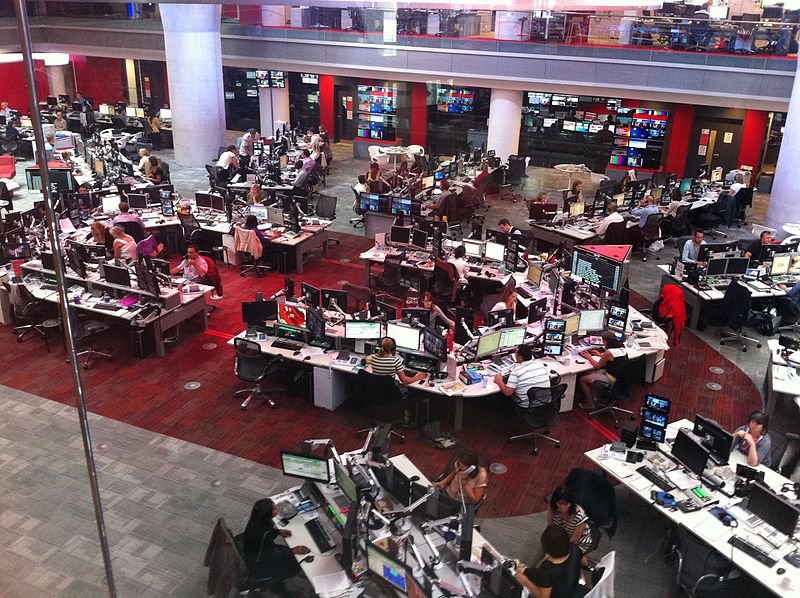
With stories about coronavirus popping up everywhere, Comment Writer Tom Denham discusses this media circus and how we can stop the spread of misinformation
It’s early morning and I walk into the kitchen of my family house. I look to the small television in the corner and see Victoria Derbyshire offering the latest news surrounding COVID-19 in the UK. On the table lies a copy of today’s Times newspaper (not mine, my father’s; I’m more of a Guardian man myself), the front cover reading ‘PM takes control of drive for virus tests’, while also displaying an image of a young doctor or nurse who, among many others, has signed a letter to the prime minister demanding more personal protective equipment for those working on the frontlines. Coronavirus related articles fill the next fifteen pages. I sit down and scroll through various social media apps while eating breakfast; Matt Lucas appears singing his comical jacket potato song which has been helping to raise money to feed NHS staff. A BBC news alert informs me that the Edinburgh Fringe festival has been cancelled. Perhaps later I’ll return to the kitchen and hear Jeremy Vine on BBC Radio 2 talking to Karen from Somerset complaining about the three children she saw on bikes the other day who were certainly not complying to the two-metre distance rule (that last one is fabricated, but, trust me, accurate in representation).
I’m trying not to be negative in my judgement towards the media’s response to COVID-19
I’m trying not to be negative in my judgement towards the media’s response to COVID-19. Many platforms are offering vital information regarding the virus and what individuals can do to avoid it. However, all this information about coronavirus is so relentless; it is, quite literally, inescapable. Frankly, it’s very understandable why all this news coverage, alongside the whole situation itself, would bring people’s moods down. Even those articles or videos following the ‘lighter’ side of coronavirus (family singalongs, self-created house games) are beginning to irritate me. But this coverage is saving lives. At 5pm, when Boris Johnson or one of his colleagues is beamed onto our television screens, the information he/they offer(s) help to slow the spread of the virus. Plus, to an arguable extent, it affords the opportunity for journalists to challenge governmental decisions regarding coronavirus and to keep them under scrutiny.
The BBC has been at the forefront of the media response to the coronavirus. It is the platform which hosts the PM’s announcements concerning the latest governmental measures to tackle the virus each day. The BBC news website now has a whole separate section dedicated to coronavirus related news. According to one source the BBC is among one of the most-trusted news brands thanks to its coronavirus coverage. In one BBC video, a journalist states that ‘here at the BBC, we are working very hard to make sure that everything we broadcast and publish is accurate and up to date’. This forms part of the effort to tackle the current ‘infodemic’: the rapid spreading of misinformation. I’m sure we’ve all seen posts on various platforms on how one can personally test whether they have the virus, or the most effective way to prevent yourself from contracting it – shovelling garlic down your gullet, squeezing lemon juice into your eyes, something like that. Mark Zuckerberg recently stated that Facebook would be taking a much harder line on removing such misinformation. Even Ladbible have promised to bring the latest, most accurate information regarding COVID-19. However, the Facebook-owned messaging platform Whatsapp is having a more difficult time stopping the spread of misinformation. Due to the platform being encrypted, it’s almost impossible to prevent chain messages regarding coronavirus from being passed on. All that they offer on their website are guidelines instructing to ‘choose reliable sources of information’ and ‘help prevent the spread of rumours’. On the whole, it’s difficult to stop the distribution of these half-truths, or complete fallacies, when people are simply trying to help others.
Keep informed, but don’t let yourself get overwhelmed by media coverage
So, what can we do amongst this overload of coronavirus-information? For a start, treat yourself. Go for a walk, read a book, watch Netflix’s Tiger King. Keep informed, but don’t let yourself get overwhelmed by media coverage. Overall, most media platforms have been really effective in their broadcasting of the outbreak. Trust Chris Witty, the BBC and the World Health Organisation in regards to the best way to avoid coronavirus and what you can do to help others in self-isolation. Most importantly, don’t spread misinformation from a vague or unreliable source. Just because your mum’s friend’s uncle’s step-daughter works for NHS Milton Keynes, it doesn’t mean her advice that sunlight can kill coronavirus is true.
Check out some other articles about the media and coronavirus:
Sensationalising the Sneeze and Condemning the Cough: Coronavirus in the Media

Comments